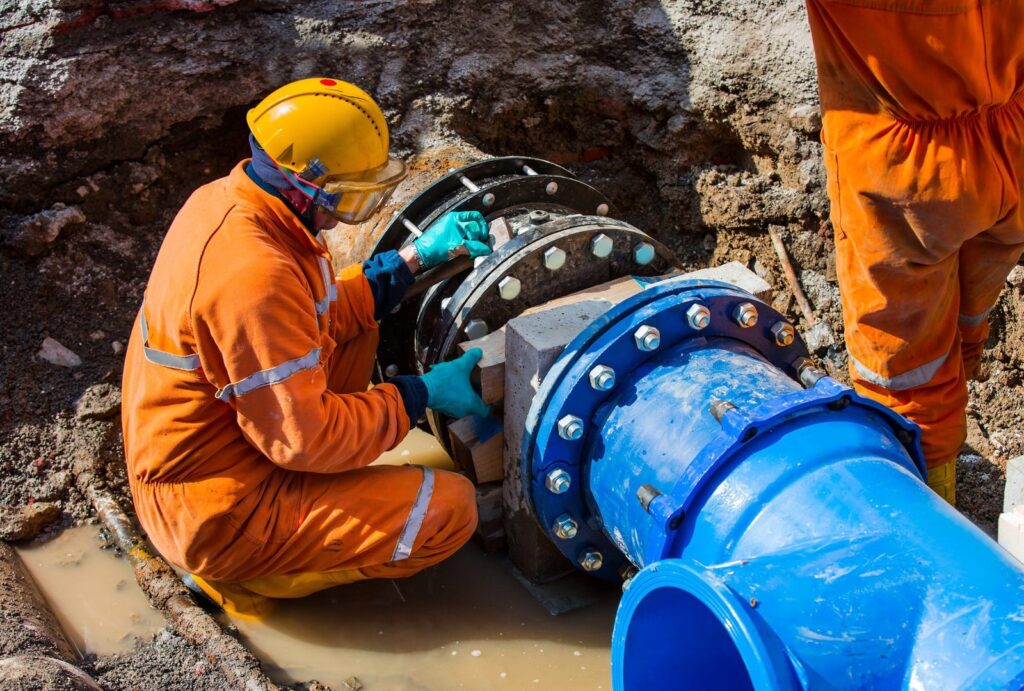Water main breaks in Montreal can lead to road closures and property damage, with repairs potentially costing a lot of money. The experts at Excavation Chanthier, an excavation and demolition company in Montreal, will reveal how water main breaks can be avoided. But first, we must examine their main causes.
THE DIFFERENT CAUSES OF WATER MAIN BREAKS
Water main breaks in Montreal generally occur due to five reasons. To prevent future breaks, it’s essential to understand them.
1. EXCAVATION WORK
When companies, public service organizations, or even property owners dig into the ground, whether for residential or commercial excavation, they may unintentionally hit water pipes with their equipment.
This can happen with a simple tool like a shovel or more commonly with heavy equipment like a mini-excavator or an excavator.
Often, this happens when the land survey isn’t thorough enough, or the plans are outdated.
CONTACT OUR EXPERTS FOR YOUR EXCAVATION WORK
2. PRESSURE AND TEMPERATURE VARIATIONS
The pressure inside a water pipe can vary greatly. One of the most common is temperature change, sometimes called thermal expansion. When the ground around a pipe freezes and warms, the pipes expand and contract, which can sometimes cause a rupture.
Pressure changes can also occur when fire hydrants are opened or closed too quickly. This phenomenon is known as “water hammer.”
3. GROUND SUBSIDENCE
Over time, ground subsidence around a water pipe can put pressure on underground pipes. If the ground subsides enough, the stress can break the pipe.
4. CORROSIVE SOILS
Some soils are corrosive and can erode the pipes over time. This is particularly common with iron pipes.
Corrosion eventually causes the pipe to rupture. This most often happens at joints or in pipes that haven’t been properly protected against corrosion.
The Ductile Iron Pipe Research Association (DIPRA) suggests polyethylene wrapping as the most effective and economical method of corrosion control. Some communities have opted to use pipes made of non-corrosive materials like C-900.
5. AGE AND MATERIALS OF THE WATER SYSTEM
Older pipes are more likely to break. For example, water mains installed before 1980 were often made of cast iron. Cast iron can be brittle and doesn’t expand or contract easily with temperature changes. When this happens, the pipes tend to crack.
There are also older sewer pipes made of clay, which can also break easily. Today, water mains are often made of ductile iron or plastic to prevent these problems.
BEST PRACTICES TO AVOID WATER MAIN BREAKS
To avoid water main breaks, you can adopt some best practices.
Whatever type of excavation or building demolition work you need to carry out in Greater Montreal, it’s important to be aware of the pipes’ location. To reduce the risk of a water main break, it is essential to follow the building demolition process carefully.
While it is important to gather information before carrying out work, whether excavating a trench, digging out a basement, or installing a semi-inground pool, it is equally important to be attentive to the environment around you.
Therefore, if you notice any soil erosion nearby, ground subsidence, temperature fluctuations, or changes in water pressure from the tap, don’t hesitate to contact Excavation Chanthier, specialists in sewer and water main repair in Greater Montreal.
To avoid water main breaks in Montreal, it’s important to carry out regular maintenance work. This prevention includes:
- Annual inspection of fire hydrants, valves, and valve chambers.
- Water leak detection.
- Inspection of the condition of sewer lines.
- Cleaning of sewer pipes and catch basins.
EXCAVATION CHANTHIER, THE SPECIALIST IN WATER MAIN REPAIRS IN GREATER MONTREAL
To prevent water main breaks in Montreal, the most important thing is to choose the right company for your excavation work. Call on Excavation Chanthier for your work, specialists in demolition, excavation, sewer and water main repair, as well as trench excavation.


